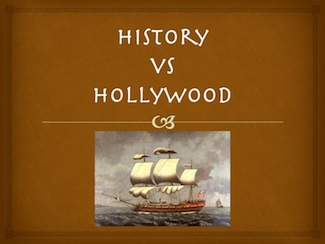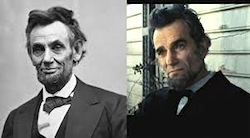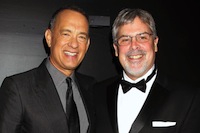History vs. Hollywood: Who Gets the Story Right?

Hollywood has always loved docudramas — they were a staple of moviemaking in the 1940s and 50s and they’ve made a strong comeback in recent years, perhaps paralleling America’s interests in “reality television.” Several docudramas were nominated for 2014 Best Picture at the Oscars, including the winner: 12 Years a Slave.

They could be assigned a recent film, or one you use in the classroom, and be tasked with researching how the filmmakers stayed faithful to, or swayed from, the historical record. There’s no shortage of fact-checkers it seems: the internet is full of detectives eager to unearth and publicize distortions and other errors-of-fact.
In this excerpt from a Hollywood Reporter story about the eagerness to “fact-check” docudramas, the author writes:
But today we live in the age of Google, when a quick fact-check is just an Internet search away. And so movies — especially movies running the gauntlet of the Oscar-vetting process — can’t get away as easily with playing fast and loose with the truth.”
While historians will tell us that much of history is interpretation of primary source materials — making “truth” somewhat elusive — we know that Hollywood often shows few qualms about mangling timelines, physical locales and other historical elements that are firmly established in the history books.
Are the filmmakers and screenwriters doing anything wrong? New York Times film critic A.O. Scott doesn’t think so: “Keep in mind artists of all kinds are supposed to be creative; it’s the job of writers, directors, and actors to invent false realities. It’s unfair to blame filmmakers if the audience sometimes confuses the real world with movie representations.”
And these comments from TIME magazine’s writers could easily apply to historical accounts as well as fiction:
Almost any novel’s plot must be compressed into a black hole of incident and image. Then there’s the challenge any movie faces of putting thoughts into words, emotions into gestures, descriptions into actions. And always the adapters must worry not just about satisfying those persnickety readers but also about pleasing the audience ignorant of the book.”
What the Common Core says
In ELA/Reading: Literature, the Common Core teaching standard “Integration of Knowledge and Ideas” (for eighth grade) says:
CCSS.ELA-Literacy.RL.8.7 Analyze the extent to which a filmed or live production of a story or drama stays faithful to or departs from the text or script, evaluating the choices made by the director or actors.
Many educators already use film adaptations, including having their students “read the novel/watch the film” and do a compare-and-contrast.
With the film award season still fresh in our minds, and knowing students love movies, I offer the following sources, culled from the news (and the web) that might be useful in helping teach that standard.
History vs. Hollywood: Teaching resources
Many students may have seen one or more of the current crop of docudramas — Lone Survivor, Saving Mr. Banks, 12 Years A Slave, Captain Phillips, Wolf of Wall Street, Philomena and Mandela, just to name a few. Or they may be familiar with some of those movies from last year: Lincoln, Argo, Zero Dark Thirty or Hitchcock. But how many will have read the books from which these films have been adapted?

To assist in this endeavor, I offer several recent articles that your students could access and read as part of meeting standard RL8.7
► Fact checking the movies: Announcing Truth Teller for Trailers (Washington Post)
► Does Anybody Care if Movies Are Historically Accurate? (Forward)
► ABSCAM Con Man: ‘American Hustle’ Wrong, Jennifer Lawrence Too Hot (ABC News)
► How Accurate Is The Monuments Men? (Slate)
► Fact Checking Lone Survivor (Salon)
► The True Story of 12 Years A Slave (TIME magazine)
► The Forgotten History Behind 12 Years A Slave (Yahoo)
► The Wolf of Wall Street: The True Story (TIME magazine)
► 
► The Real Mandela vs. The Movie Version (Salon)
► Searching for Philomena’s Real Son (NYT)
► True or False: Fact Checking Films is Futile (The Hollywood Reporter – available via EBSCO)
► Just How True Are Hollywood’s ‘True Stories’? (news.com.au)
► Films Inspired by True Events Walk A Tricky Line (LA Times)
► Hollywood vs. history: A lot of hit movies have tackled real-life events. Two New York Times film critics consider how to watch a ‘historical’ movie. (NYT UPFRONT)
► Text, lies and celluoid (This Magazine)
Finally: Although not based on historical events, Gravity also garnered a good deal of criticism (and defense) from scientists and science geeks: Here’s what ‘Gravity’ gets right and wrong about space.
Frank W. Baker is a media literacy education consultant and the author of three books, including Media Literacy In the K-12 Classroom (ISTE, 2012). He contributed two chapters to Mastering Media Literacy (Solution Tree, 2014). In November 2013, Frank was a co-recipient of the National Telemedia Council‘s annual Jessie McCanse Award given for individual contributions to the field of media literacy over at least 10 years. Follow him on Twitter @fbaker.

































Argo was the worst departure from the truth.